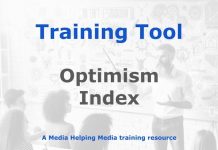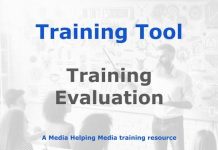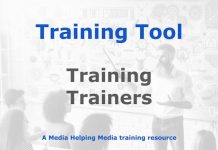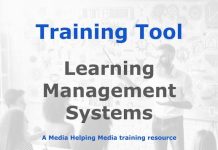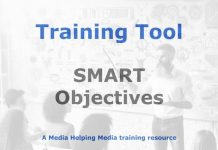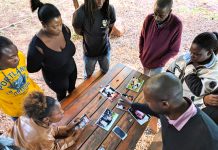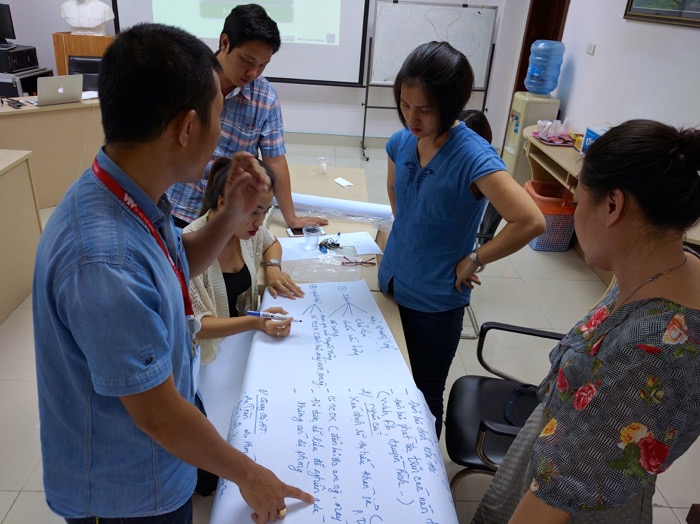
Media training is about investing in people – your staff. They are your most precious resource. Without well-trained and motivated staff, you will struggle to deliver the right quality of content to your audience.
This is your team: you have either selected or inherited them and now you need them to help you achieve your objectives. If they have had a stake in developing those objectives, so much the better.
You need motivated team members who are clear about what is required of them, and who are totally committed to helping you achieve your unit and company goals.
They can do that only if they know what those goals (objectives) are, and are aware of their part in achieving them. Don’t presume they will know.
Staff development
Media training done badly can damage a news organisation. Media training which focuses on staff development, and which is tied to the media organisation’s core editorial proposition and business plan, is essential.
The training you offer your staff needs to give them the skills to do the job they are being asked to do. If your staff can be trained and encouraged to blossom, it might well take your organisation to levels you have not previously imagined.
Appraisals
The best training programmes emerge from a media organisation’s appraisal system, and are carried out internally, with perhaps a few outside trainers brought in to offer a broader or more specialised perspective.
Each member of staff will have an annual appraisal. These will usually involve quarterly reviews where performance is assessed against agreed objectives.
In a previous module we looked at the importance of setting corporate, departmental, unit and personal objectives. These objectives should reflect the news organisation’s vision and values and cascade through all levels.
The purpose of appraisals should be to help staff achieve their full potential within the business; they need to agree and aim to achieve the objectives you set for them which are related to their unit, department and the overall company objectives.
Appraising staff against agreed objectives also helps you assess whether the staff member is good enough for the job. It also reveals areas where staff need to develop and where their talents can be best used.
The appraisal system must be linked to a training programme which focuses on business needs and personal development.
The appraisal must not be confrontational, and nor should it be seen as a time for reprimands.
It is an opportunity to work closely with members of your team, and help them to discover how best they can achieve the goals (objectives) you have set for them.
Invest in staff
Your staff will respond better to the objectives you set for them (and your appraisal of their work) if you treat them as valued colleagues.
If you include them in the way the news organisation is developing as a business you might find that they respond better to the challenges you set for them.
To invest in your staff you should:
- Involve: Make sure they feel part of the news organisation by keeping them informed about how the business is developing via the intranet, newsletters and regular meetings.
- Nurture: They need to feel that the organisation they are working for has their interests at heart and that it will help them grow in their careers.
- Value: Never view your staff as numbers in a work rota; value them as individuals who can bring different and fresh perspectives to the company.
- Engage: Ask them for their views, and, when they offer them, take them seriously and consider implementing the best ideas.
- Support: Make sure you take time to listen and understand when they are finding things tough, don’t just leave it to HR (the human resource department – the department which usually deals with the hiring, development and disciplining of staff).
- Training: You are more likely to attract and retain staff if you have a reputation for offering the best in-house and off-site training.
Create a detailed plan for staff development
Let’s look at each of those stages more closely.
Involve
This is probably one of the most important areas. If your staff don’t understand what the business needs from them, then the rest of the training won’t make sense. Without that understanding they won’t see the importance of your objectives and their part in realising them. If you take time to include them, by sending out regular updates about what is happening, they will be better motivated and more likely to fulfil their potential.
Nurture
Your staff should always be looking for advancement, whether it is professional development in terms of learning, earning, or whether it is promotion in order to take on more responsibility, produce better work and earn more. You might not be in a position to offer great financial rewards; this might not always be their main concern anyway. Some will thrive on being given extra responsibility. Some will want to feel that you are interested in their growth. Some will want to be stretched. All will want to be in an environment where they feel that they can learn and improve in your news organisation. If they do, you will find it easier to retain skilled staff and attract new, aspiring and ambitious staff.
Value
It’s too easy to hire staff because you have a particular job to be done. That’s fine, but you might find they soon grow out of the job. Always hire staff to do the next job along the line. Don’t hire with only the current vacancy in mind. Yes, you will have to fill that role, but you don’t want to hire someone to do the same job for the rest of their lives. You need to hire for the future, too. If you hire with that in mind, you are more likely to value your staff and they are more likely to pay you back by taking responsibility.
Engage
It will always be hard to motivate staff if they feel that they have no say in the organisation’s running. You need to engage them at every level. Senior managers will have to make many of the hard business decisions, but never be afraid of devolving responsibility and asking more junior staff for their views. You might find that they respond in a far more positive and helpful way than you imagined they would. Engaging the staff in your media organisation’s business makes them more likely to put in extra effort when required.
Support
Too many managers back off when a member of staff is in trouble. You need to be there for them, or at least ensure that someone is. It’s not about becoming an agony aunt, it’s about helping them through the tough times, understanding the issues they face, and helping them address and solve them. If you nurture and value them you will find the effort is amply rewarded.
Training
Training is often an area of staff development viewed as a burden, an extra cost, or a box to be ticked. If you take that attitude, your staff will never grow. Make sure all training is relevant. It should stem from the process of objective setting and appraisals. It will relate the objectives you have set for your staff (previously agreed with the member of staff) and with the conversations you have with them during their appraisals. The training sets out what needs to happen for them to meet their objectives.
A strong training programme, tied to your overall strategy, is crucial for a successful media business.
